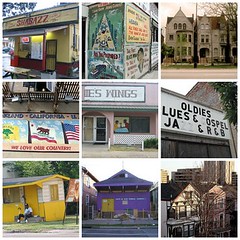Nine Times
 A recent Gambit article recaps the Neighborhood Story Project, which I've mentioned here before and which has gotten a decent amount of attention in the past. About halfway down, there's something I hadn't known, which is the existence of a newer post-Katrina volume in the series, titled Coming Out the Door for the Ninth Ward, "written by several members of Nine Times, a social aid and pleasure club." The piece notes:
A recent Gambit article recaps the Neighborhood Story Project, which I've mentioned here before and which has gotten a decent amount of attention in the past. About halfway down, there's something I hadn't known, which is the existence of a newer post-Katrina volume in the series, titled Coming Out the Door for the Ninth Ward, "written by several members of Nine Times, a social aid and pleasure club." The piece notes:The powerful last chapter centers on the flooding, exodus and painfully slow return of Ninth Ward folk. "We have another Katrina through here," bristles Ella, a queen of the Blackfoot Hunters Mardi Gras Indian tribe. "I'm gonna wade in the f--king water and stay my ass right here. I told my children, 'I do not want to die and be buried in Houston. ... You all bury me in Houston, I don't know nobody in them graveyards."There's lots of interesting stuff in the article (some of it drawn from the books) about New Orleans public housing, including the ill-fated Desire complex that is of course the subject of a long chapter in LfNO.
Also there's this about the parading organizations:
The stories of the clubs [in Coming Out the Door.... ] have timely resonance since City Hall quadrupled the cost of a parading permit, to more than $4,000. The city claims the cost of policing parades has risen because of violence at the second lines. Club members, who spend months working on costumes, argue for the peaceful dignity of their tradition. The crisis of the second-line clubs has thrown a searchlight on the deeper question: Is poverty the problem, or a drug culture permeated with guns?Wynton Marsalis made a passionate argument for the second line in his subcommittee report to the Bring New Orleans Back Commission. The lengthy report documented 70 Social Aid and Pleasure Clubs and 47 Mardi Gras Indian gangs pre-Katrina. No one knows just how many of these groups are displaced.



<< Home